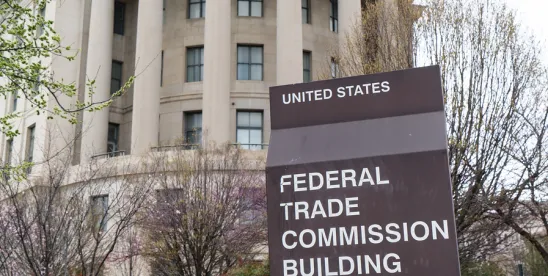On July 9, 2021, President Biden issued Executive Order 14036, “Promoting Competition in the American Economy,” which broadly targets anticompetitive practices and corporate consolidation across many sectors of the U.S. economy. The ambitious and wide-ranging Executive Order contains 72 initiatives by more than a dozen federal agencies aimed at improving competition, reducing prices for consumers, boosting wages for workers, and facilitating innovation.
According to the Executive Order, a “whole-of-government” approach is necessary “to address overconcentration, monopolization, and unfair competition in the American economy.” Thus, the Executive Order calls upon the federal antitrust agencies – the Federal Trade Commission (FTC) and the Department of Justice (DOJ) – as well as the Department of Agriculture, the Department of Transportation, the Federal Communications Commission, the Federal Maritime Commission, and the Federal Energy Regulatory Commission, among others, to collectively and vigorously enforce the antitrust laws to challenge harmful transactions and combat excessive concentration of industry and abuses of market power across a wide swath of the economy, such as labor markets, agricultural markets, healthcare markets, and the tech sector.
Much of the Executive Order is broad and directs the federal agencies to pursue its policy goals through rulemakings or other proceedings that will take time to develop and implement and may be subject to legal challenge. However, the Executive Order does set out a number of specific measures, such as the creation of a White House Competition Council within the Executive Office of the President to coordinate the federal government’s efforts. The Council will be led by the Director of the National Economic Council. The Attorney General will serve on the Council along with several cabinet secretaries, and the Chair of the Council may invite the participation of independent agency heads, including the Chair of the FTC.
With regard to merger enforcement, the Executive Order specifically instructs the FTC and DOJ to review the current horizontal and vertical merger guidelines and consider whether revisions are warranted. This is particularly noteworthy because both merger guidelines have recently been updated. The horizontal merger guidelines were last updated in 2010 under President Obama, and the vertical merger guidelines were replaced just last summer, although FTC Commissioners Rohit Chopra and Rebecca Kelly Slaughter, both Democrats and in the minority at the time, had dissented from the issuance of the new vertical merger guidelines. Shortly after the Executive Order was issued, FTC Chair Lina Khan and Richard Powers, the Acting Assistant Attorney General of DOJ’s Antitrust Division, released a joint statement that their agencies would review the current merger guidelines to determine if they are “overly permissive” and “with the goal of updating them to reflect a rigorous analytical approach,” in order to “ensure that the merger guidelines reflect current economic realities and empirical learning and that they guide enforcers to review mergers with the skepticism the law demands.” These developments portend potentially significant changes to the merger guidelines in favor of stricter enforcement and a greater burden on merger parties to justify transactions on efficiency grounds. The Executive Order also reaffirms the federal antitrust agencies’ authority to challenge previously consummated mergers that violate the competition laws, and directs greater attention to serial mergers and acquisitions of nascent competitors.
Another significant area of focus in the Executive Order is competition in labor markets. In order to boost employee wages and make it easier for workers to change jobs, the FTC is directed to exercise its statutory rulemaking authority under the FTC Act to ban or limit the use of non-compete clauses and the like that limit worker mobility. The Executive Order also encourages the FTC to ban “unnecessary” occupational licensing restrictions, which can restrict workers’ ability to find new work, especially across state lines. To guard against wage collusion, the FTC and DOJ are encouraged to consider whether to strengthen the October 2016 Antitrust Guidance for Human Resource Professionals to further restrict employers’ ability to share information on worker pay.
Additionally, the FTC is encouraged to exercise its rulemaking authority to address practices that inhibit competition in areas such as unfair data collection and surveillance, unfair competition in major Internet marketplaces, and unfair tying or exclusionary practices in the brokerage or listing of real estate.
The Executive Order calls on executive agencies to take several steps to increase competition in the healthcare sector, including initiatives aimed at reducing prescription drug prices and increasing support for generic and biosimilar drugs. The Executive Order also directs the Attorney General and the Secretary of Commerce to work together to determine whether to revise their position on the intersection of intellectual property law and the antitrust laws in order to avoid the potential for anticompetitive extension of market power beyond the scope of granted patents and to protect standard-setting processes from abuse. Additionally, it calls for a review of the bank merger guidelines, as well as actions to bolster competition and further consumer protection in the airline, railroad, and maritime and shipping industries.
This Executive Order is the most recent example of the Biden Administration’s efforts to rein in powerful corporations and intensify scrutiny over business conduct as well as mergers and acquisitions. Shortly after taking office, the President appointed Tim Wu, a Columbia Law School professor and leader in the progressive movement to break up Big Tech, to serve on the National Economic Council as a special assistant to the President for technology and competition policy, a newly created position. Just last month, the Senate confirmed the appointment of Lina Khan to the FTC, and immediately after her confirmation, the President elevated her to serve as Chair of the agency. Khan is known as a fierce advocate for more robust antitrust enforcement, and in her short time as Chair, the FTC has already rescinded a 2015 policy statement that limited the FTC’s use of its authority to prohibit anticompetitive business tactics under Section 5 of the FTC Act, thereby paving the way for broader enforcement under Section 5 going forward. Chair Khan also just announced that the FTC plans to repeal its 1995 policy that has allowed parties to merger clearance settlements to generally dispense with seeking "prior approval" before entering into new merger agreements.
While it will be some time until the Executive Order’s effects on antitrust enforcement are fully realized, we are already seeing the beginning of a seismic shift in antitrust policy at the FTC and DOJ since President Biden took office, and further changes are likely in the weeks and months ahead.




 />i
/>i

